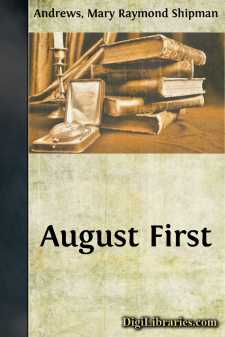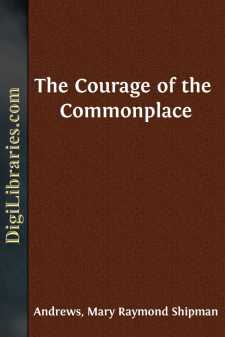Categories
- Antiques & Collectibles 13
- Architecture 36
- Art 48
- Bibles 22
- Biography & Autobiography 813
- Body, Mind & Spirit 142
- Business & Economics 28
- Children's Books 17
- Children's Fiction 14
- Computers 4
- Cooking 94
- Crafts & Hobbies 4
- Drama 346
- Education 46
- Family & Relationships 57
- Fiction 11829
- Games 19
- Gardening 17
- Health & Fitness 34
- History 1377
- House & Home 1
- Humor 147
- Juvenile Fiction 1873
- Juvenile Nonfiction 202
- Language Arts & Disciplines 88
- Law 16
- Literary Collections 686
- Literary Criticism 179
- Mathematics 13
- Medical 41
- Music 40
- Nature 179
- Non-Classifiable 1768
- Performing Arts 7
- Periodicals 1453
- Philosophy 64
- Photography 2
- Poetry 896
- Political Science 203
- Psychology 42
- Reference 154
- Religion 513
- Science 126
- Self-Help 84
- Social Science 81
- Sports & Recreation 34
- Study Aids 3
- Technology & Engineering 59
- Transportation 23
- Travel 463
- True Crime 29
Mary Raymond Shipman Andrews
Mary Raymond Shipman Andrews (1860-1936) was an American author known for her historical and patriotic fiction. She gained fame with her short story "The Perfect Tribute" (1906), which romanticized Abraham Lincoln's Gettysburg Address. Andrews' work often reflected themes of honor, duty, and national pride, contributing significantly to early 20th-century American literature.
Author's Books:
Sort by:
THE DITCH THE BOYan American soldierTHE BOY'S DREAM OF HIS MOTHERANGÉLIQUEFrench childrenJEAN-BAPTISTEFrench childrenTHE TEACHERTHE ONE SCHOOLGIRL WITH IMAGINATIONTHE THREE SCHOOLGIRLS WITHOUT IMAGINATIONHESHETHE AMERICAN GENERALTHE ENGLISH STATESMAN The Time.—A summer day in 1918 and a summer day in 2018[pg 003]FIRST ACT The time is a summer day in 1918. The scene is the first-line trench of...
more...
I. THE FATHER, by William Dean Howells As soon as we heard the pleasant news—I suppose the news of an engagement ought always to be called pleasant—it was decided that I ought to speak first about it, and speak to the father. We had not been a great while in the neighborhood, and it would look less like a bid for the familiar acquaintance of people living on a larger scale than ourselves, and less...
more...
The Bishop was walking across the fields to afternoon service. It was a hot July day, and he walked slowly—for there was plenty of time—with his eyes fixed on the far-off, shimmering sea. That minstrel of heat, the locust, hidden somewhere in the shade of burning herbage, pulled a long, clear, vibrating bow across his violin, and the sound fell lazily on the still air—the only sound on earth...
more...
A GOOD SAMARITAN The little District Telegraph boy, with a dirty face, stood at the edge of the desk, and, rubbing his sleeve across his cheek, made it unnecessarily dirtier. "Answer, sir?" "No—yes—wait a minute." Reed tore the yellow envelope and spread the telegram. It read: "Do I meet you at your office or at Martin's and what time?" "The devil!" Reed...
more...
THE LIFTED BANDAGE The man let himself into his front door and, staggering lightly, like a drunken man, as he closed it, walked to the hall table, and mechanically laid down his hat, but still wearing his overcoat turned and went into his library, and dropped on the edge of a divan and stared out through the leaded panes of glass across the room facing him. The grayish skin of his face seemed to fall...
more...
AUGUST FIRST "Whee!" The long fingers pulled at the clerical collar as if they might tear it away. The alert figure swung across the room to the one window not wide open and the man pushed up the three inches possible. "Whee!" he brought out again, boyishly, and thrust away the dusty vines that hung against the opening from the stone walls of the parish house close by. He gasped; looked...
more...
THE PERFECT TRIBUTE On the morning of November 18, 1863, a special train drew out from Washington, carrying a distinguished company. The presence with them of the Marine Band from the Navy Yard spoke a public occasion to come, and among the travellers there were those who might be gathered only for an occasion of importance. There were judges of the Supreme Court of the United States; there were heads...
more...
The girl and her chaperon had been deposited early in the desirable second-story window in Durfee, looking down on the tree. Brant was a senior and a "Bones" man, and so had a leading part to play in the afternoon's drama. He must get the girl and the chaperon off his hands, and be at his business. This was "Tap Day." It is perhaps well to explain what "Tap Day" means;...
more...









